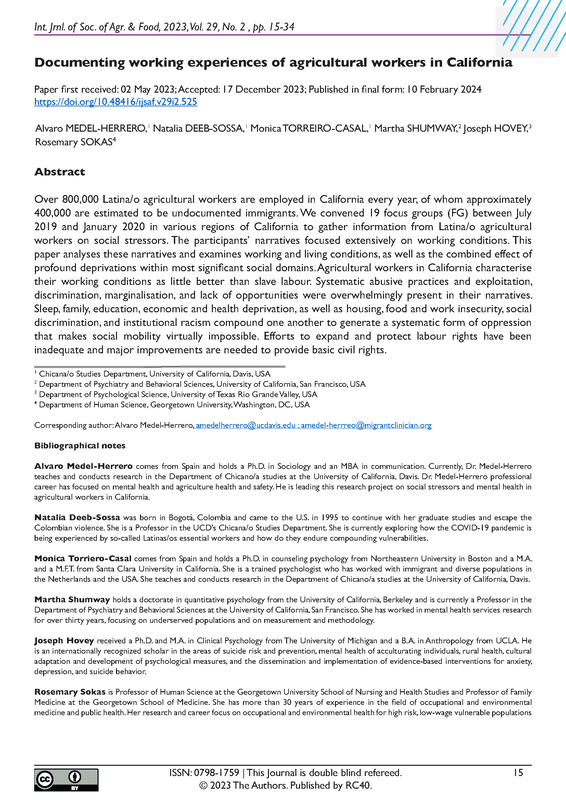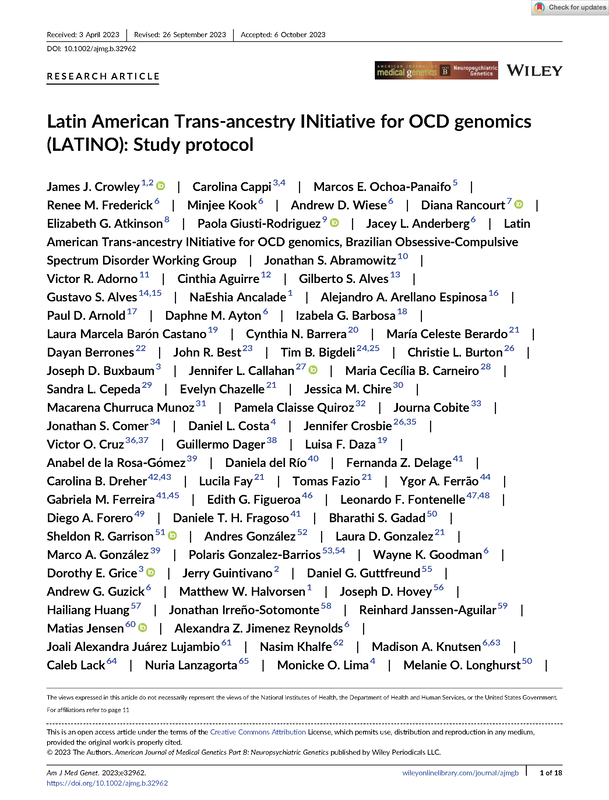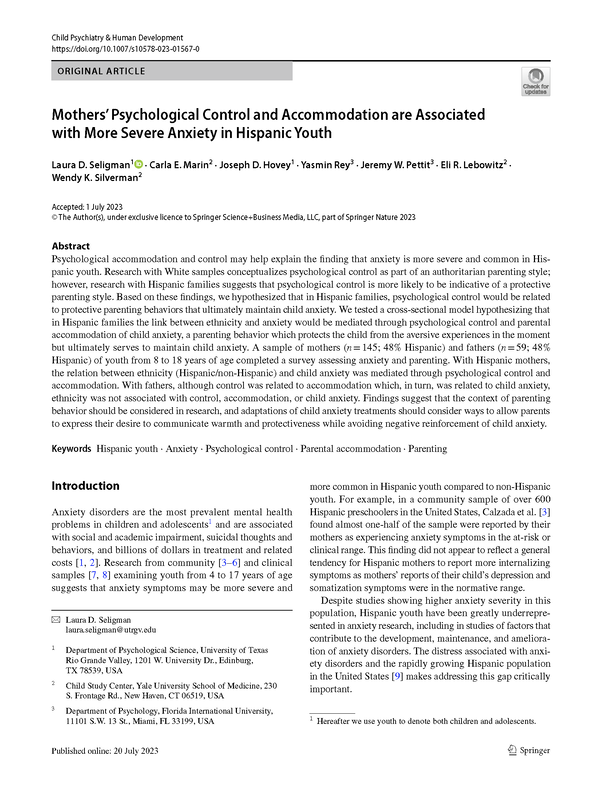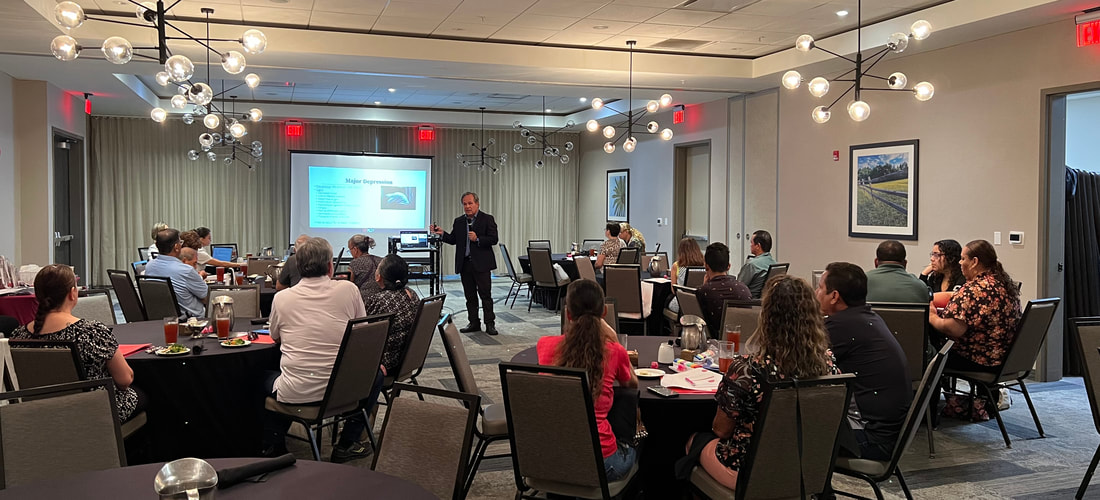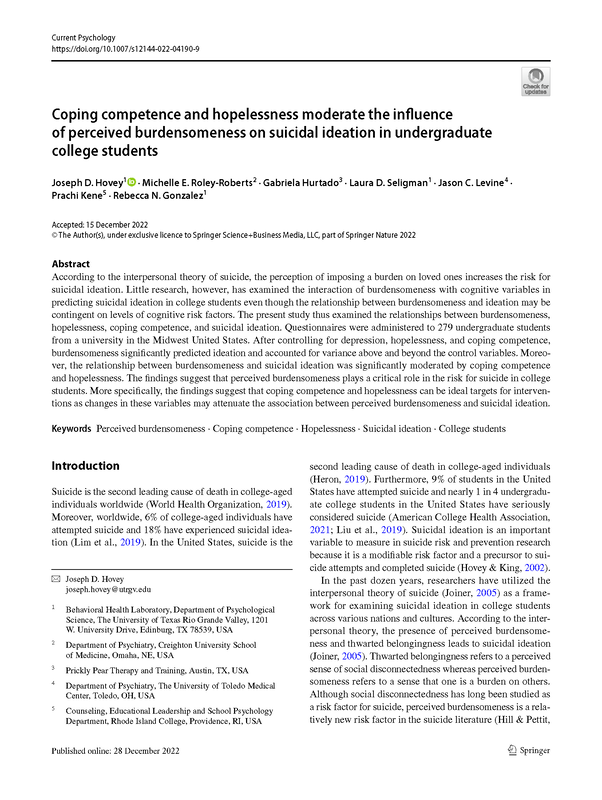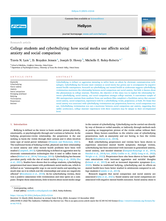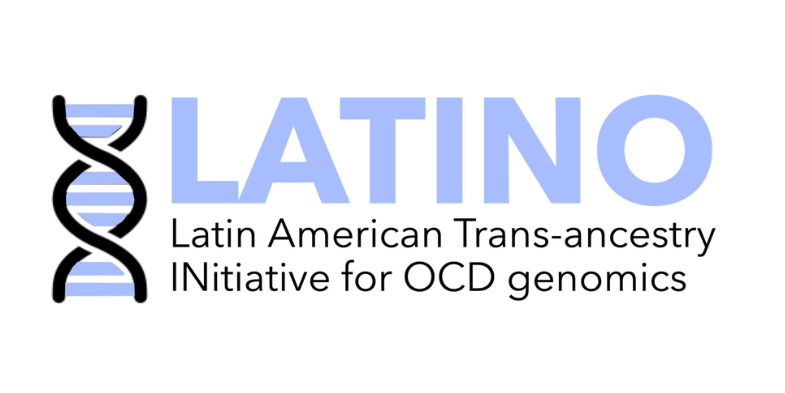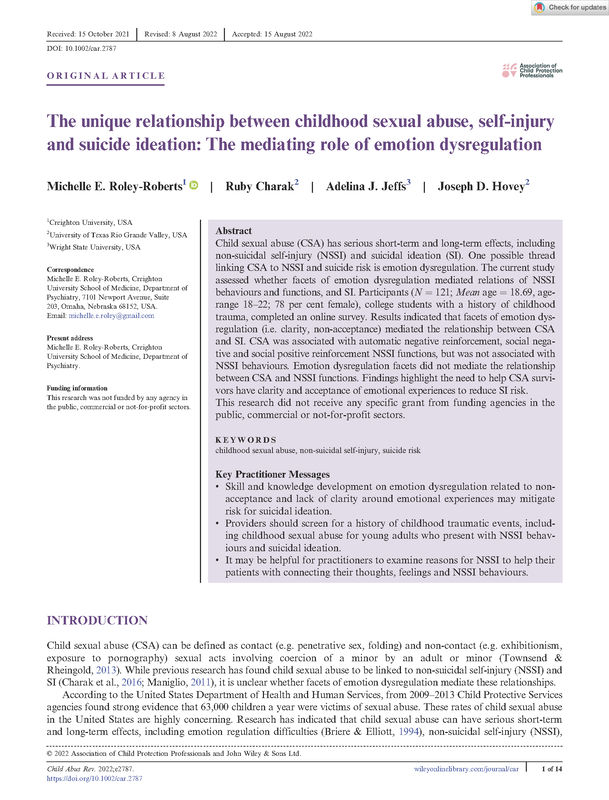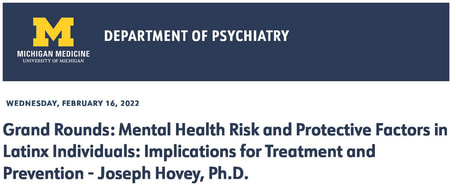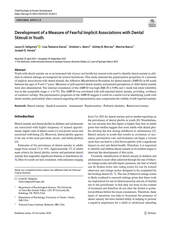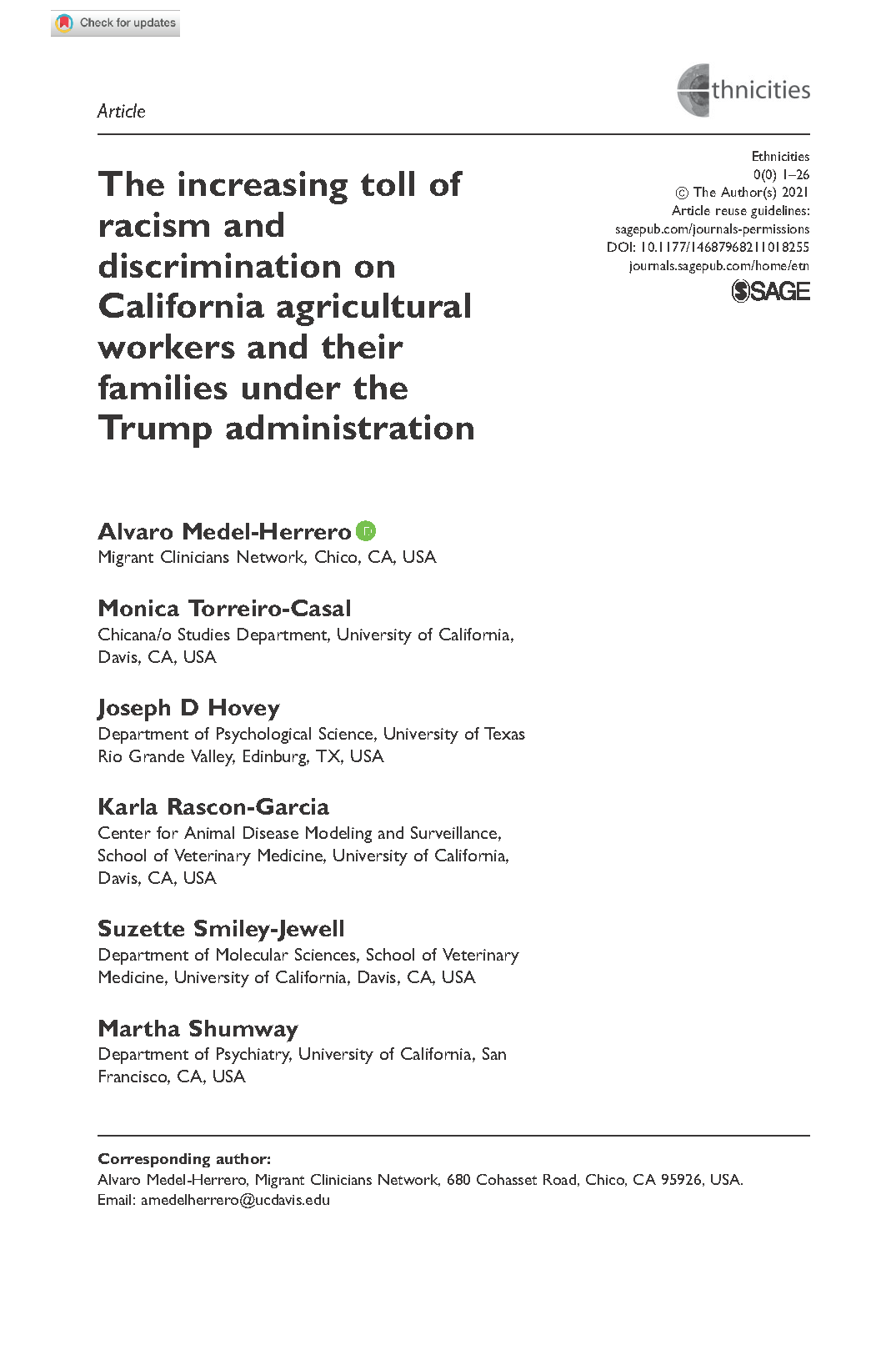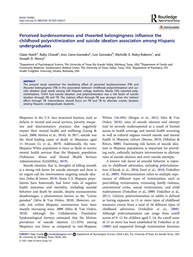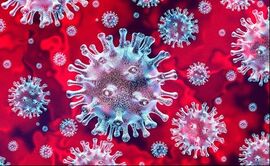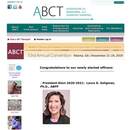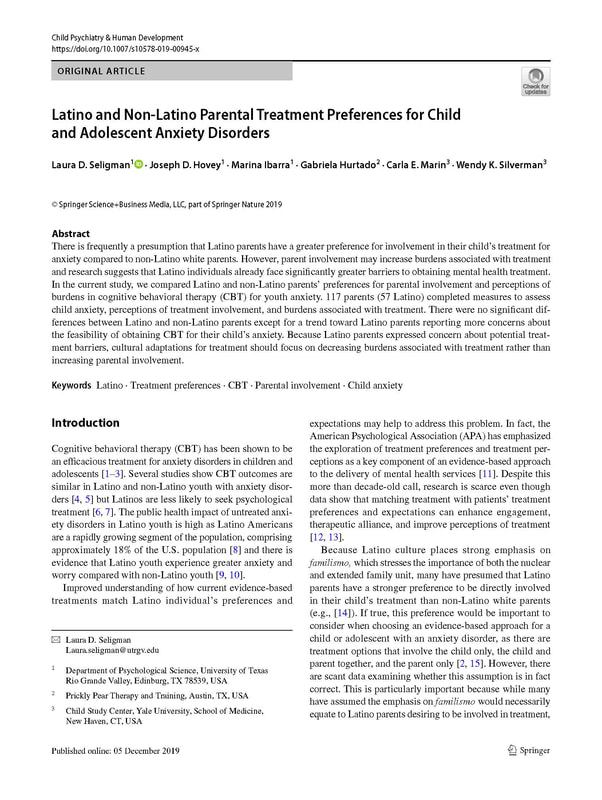New Research Article on Mental Health Help-Seeking Intentions in Mexican Heritage Individuals (June 2024)
|
Scant research has examined intentions to seek mental health services in Mexican heritage individuals. In a newly published article in the Journal of Immigrant and Minority Health, Dr. Hovey and colleagues utilized mixed methods to examine--in Mexican heritage individuals in the Rio Grande Valley--behavioral intentions to seek mental health care for depression. Results indicated that greater intentions to seek help were significantly associated with higher perceived benefits (for seeking mental health care) and lower perceived barriers. Perceived barriers to mental health help-seeking identified by participants included cost, lack of insurance, wanting to handle problems on one's own, not feeling comfortable sharing feelings, not knowing where to go for help, and not wanting to be labeled as crazy. Perceived benefits included improved mental health, reduced stress, increased self-confidence, improved communication, improved life satisfaction, increased social support, and improved sleep. To download a copy of this article, please click here.
|
ScholarGPS utilizes computational systems and processes to identify and analyze the impact of over 200 million scholarly publications. Their algorithms categorize research into distinct specialties, generate over 30 million scholar profiles, and generate quantitative rankings of individual scholars in terms of their productivity as well as the quality and impact of their scholarly work. According to ScholarGPS, Dr. Hovey is ranked as the #4 scholar in the world in the area of Suicidal Ideation.
Dr. Hovey Awarded the Faculty Excellence Award in Community Engagement (April 2024)
|
Dr. Hovey has been named the recipient of the 2024 Faculty Excellence Award in Community Engagement by the College of Liberal Arts at the University of Texas Rio Grande Valley. According to the nomination letter submitted by a colleague, "Dr. Hovey's contributions in the area of community engagement are extensive. His research (has focused on) underserved groups and on changing the inequities in health they experience." Moreover, "the importance of community-based, community-focused work, as well as proper methods for conducting research in the community, is conveyed to students in his lab, increasing the cadre of future researchers who understand and appreciate these approaches and who are likely to implement them themselves. Dr. Hovey also showcases his dedication and service to the community by providing consultation and training to community groups within and outside the Rio Grande Valley, on issues pertaining to mental health.... (His) tireless efforts and achievements have impacted the health and well-being of those who reside in the Rio Grande Valley...." Dr. Hovey is honored to receive this award.
|
Dr. Hovey and his students gave a series of presentations at the annual conference for the Southwestern Psychological Association held in San Antonio. Each of these studies unveiled brand new data. For example, as depicted in a poster, in a nationwide sample of adolescents, they found that aquaphobia was very strongly associated with a lack of swimming ability and skills and that this association was significantly stronger for Mexican adolescents in comparison to African American and White adolescents. Another poster presented qualitative findings on dental care beliefs across racial/ethnic groups in which they found numerous group differences in dental beliefs (e.g., Latino/a individuals more greatly endorsing treatment as a priority compared to preventive care). Finally, they presented early findings from a nationwide longitudinal study of COVID-19 and mental health. Their findings indicated that, early in the pandemic, those individuals who perceived high risk of infection were at an increased risk for suicidal thoughts if they also had difficulty tolerating uncertainty about Covid, consistently thought about Covid, and had difficulty cognitively attending to the here-and-now.
New Research Article on the Working Experiences of Agricultural Workers in California (December 2023)
|
Dr. Hovey is an author on a newly published article in the International Journal of Sociology of Agriculture and Food. The article details qualitative data findings from 19 focus groups in California in which Latino/a agricultural workers discuss their working and living conditions, as well as the combined effect of profound deprivations within most significant social domains. The social stressors experienced by the agricultural workers include their experiences of abusive practices and exploitation from their employer; discrimination, racism, and marginalization; housing and food insecurities; and health difficulties--all of which contribute to a lack of social mobility opportunities for the agricultural workers. To download a copy of this article, please click here.
|
New Research Article on the Latin American Trans-ancestry INitiative for OCD genomics (LATINO) Study Protocol (November 2023)
|
Dr. Hovey is a site MPI for the Latin American Trans-ancestry INitiative for OCD genomics (LATINO), which is a large, multi-site NIMH-funded project that is assessing genetic and environmental determinants of obsessive-compulsive disorder (OCD) in Latin individuals in North and South America. Dr. Hovey is an author on a new article published in the American Journal of Medical Genetics Part B: Neuropsychiatric Genetics. The article discusses how scant research has examined genetic and environmental factors of OCD in Latin individuals; how greater research on determinants of OCD in Latin individuals is needed to help offset health disparities in the treatment of OCD in Latin individuals; and reviews the LATINO study protocol. For a copy of this article, please click here.
|
Interview on Vaquero Radio (September 2023)
|
Dr. Hovey was interviewed by Vaquero Radio, the University of Texas Rio Grande Valley's student radio station. The interview was conducted in recognition of National Suicide Prevention Week. During the interview, Dr. Hovey spoke in some depth about suicide risk and protective factors in college students, including a discussion about how the COVID pandemic has increased the risk for college suicide. To hear excerpts of the interview from the Vaquero Radio website, please click here.
|
New Research Article on the Association of Parenting Style to Anxiety in Hispanic Youth (July 2023)
|
Although research has shown that Hispanic youth experience more severe anxiety in comparison to non-Hispanic youth, Hispanic youth have been greatly underrepresented in anxiety research. In a newly published article in Child Psychiatry & Human Development, Dr. Hovey and colleagues examined whether mothers' psychological control and accommodation are associated with more severe anxiety in Hispanic youth. They found that, for Hispanic mothers, the relationship between ethnicity (Hispanic/non-Hispanic) and child anxiety was mediated through psychological control and accommodation. In other words, for Hispanic families, greater maternal psychological control appeared to increase maternal accommodation of child anxiety which, in turn, appeared to increase and maintain anxiety in their children. Their findings suggest that the context of parenting behavior is important to consider in both research and clinical work; and that child anxiety treatments should consider adapting ways for parents to express their desire to communicate warmth and protectiveness while avoiding negative reinforcement of child anxiety. To download a copy of the article, please click here.
|
Dr. Hovey gave a community-based presentation at the Superior HealthPlan's Ambetter Health Member Advisory Group Meeting. He gave an overview on signs of, and ways to cope against, major mental health difficulties including major depression, anxiety disorders, and suicide thoughts and behavior. For a copy of the slides for Dr. Hovey's presentation, please click here.
Appearance on TV Azteca (June 2023)
|
Dr. Hovey and Andrea Caro Torres, B.S., from the Behavioral Health Lab, were interviewed on the Hablando De... show on TV Azteca, Mission TX. Although the main topic of discussion was dental phobia and the lab's dental phobia intervention study, they also discussed a variety of other topics including suicide risk in Latin individuals and how to differentiate between fear and anxiety.
|
Dr. Hovey gave a presentation at the Rio Grande Valley Border Health Coalition meeting. He presented on the topic of dental anxiety. He discussed the prevalence and etiology of dental anxiety and dental phobia, the major health repercussions associated with dental phobia and poor oral health, how to prevent and treat dental phobia, why dental phobia appears to be elevated in Latin groups, and why dental phobia appears to be a particularly acute problem in the Rio Grande Valley. For a copy of the slides for Dr. Hovey's presentation, please click here.
Dr. Hovey has been re-appointed as a commissioner on the American Psychological Association Commission on Accreditation (APA CoA). The APA C0A is the primary accreditor in the United States for doctoral programs in Clinical, Counseling, and School Psychology. The APA CoA also accredits internship programs in professional psychology as well as postdoctoral residency programs that provide education and training in preparation for professional practice. As commissioner, Dr. Hovey fills the APA Board of Scientific Affairs seat and serves as Co-Chair of the Research Workgroup.
Although the rapid developmental trajectory experienced by college students often leads to severe stress, and although previous research has documented elevated levels of suicide thoughts and behavior in college students, scant research has examined the influence of cognitive risk factors on perceived burdensomeness and suicide thoughts and behavior in college students. Dr. Hovey and colleagues thus assessed how suicidal ideation experienced by college students is significantly impacted by the moderating influences of coping competence and hopelessness on burdensomeness. Their findings identify coping competence and hopelessness as ideal targets for interventions as changes in these variables may attenuate the association between perceived burdensomeness and suicidal ideation and, in turn, decrease the risk for attempted suicide. To download a copy of this article, please click here.
New Research Article on Social Anxiety and Cyberbullying (December 2022)
|
Several years ago, Dr. Hovey and some of the students in his lab developed the Social Media Cyberbullying Questionnaire (SMCQ), which measures cyberbullying victimization and perpetration that occur via social media avenues. Some of these findings are now being published including a new article on social anxiety and cyberbullying. The findings in this article indicated that college students who more often socially compare themselves to other individuals were at greater risk for experiencing social anxiety. The experience of social anxiety, in turn, was significantly associated with cyberbullying victimization and perpetration. To download a copy of the article, please click here. For those interested in learning more about the SMCQ, please contact Dr. Hovey.
|
Dr. Hovey is a site-PI, along with Dr. Laura Seligman, on The Latin American Trans-ancestry INitiative for OCD genomics (LATINO), an NIH-funded research project whose goal is to identify genetic and environmental factors contributing to the development of Obsessive-Compulsive Disorder (OCD) in individuals of Latin descent. The study is being conducted by groups of researchers--including Dr. Hovey's and Dr. Seligman's Behavioral Health Lab--throughout North America and South America. For detailed information about this project, please click here.
New Grant Award from the National Institute of Dental & Craniofacial Research (NIDCR) (September 2022)
|
Dr. Hovey is an Investigator on a two-year, UG3 grant and a five-year, UH3 grant from the National Institutes of Health's NIDCR. Laura Seligman, PhD, ABPP, UTRGV Professor, is the grant's Principal Investigator; Liza Talavera-Garza, PhD, UTRGV Assistant Professor, is an Investigator; and Katelyn Villa, MS, Research Associate III at UTRGV, is Study Coordinator for the grants. The UG3 grant provides funds for the development of a one-session treatment for youth with dental phobia and the UH3 grant will provide funds to assess the effectiveness of the treatment. The findings from this clinical trial will provide vital information to the fields of Dentistry and Clinical Psychology on a cost-effective intervention to combat dental phobia in youth, which is a common and often deleterious disorder that may lead to serious short- and long-term health consequences.
|
New Research Article on the Relationships between Child Abuse, Emotion Dysregulation, Self-Injury, & Suicide Ideation (September 2022)
|
Dr. Hovey is an author on a new article published in Child Abuse Review. This study examined the extent to which emotion dysregulation mediated the relationship between child sexual abuse and non-suicidal self-injury, and child sexual abuse and suicide ideation. The findings suggest that childhood trauma can lead to emotion dysregulation difficulties which, in turn, can increase the risk for suicide ideation. The findings highlight the need for mental health interventionists to assist childhood trauma survivors in obtaining clarity and acceptance of emotional experiences as a means to mitigate the risk for suicide ideation. To download a copy of this article, please click here.
|
Presentation at the Suicide Prevention Symposium (June 2022)
|
Dr. Hovey gave a presentation at the Suicide Prevention Symposium. The title of his presentation was The Influence of Adherence to Traditional Cultural Values on Family Conflict and Emotion Dysregulation in Predicting Suicide Behavior in Latina Adolescents. He presented on recent research findings that indicate that lack of adherence to traditional cultural values in female Mexican American adolescents may to lead to family conflict which, in turn, may lead to suicide behavior. The strength of the relationship between family conflict and suicide behavior depends however on how much emotional dysregulation the adolescent experiences. To download a copy of the PowerPoint slides for his presentation, please click here.
|
Dr. Hovey presented at the University of Michigan Medical School, Department of Psychiatry, Grand Rounds. Dr. Hovey was invited by the Department's Diversity, Equity, and Inclusion Committee. The title of his Grand Rounds was Mental Health Risk and Protective Factors in Latinx Individuals: Implications for Treatment and Prevention. For a copy of the PowerPoint slides for Dr. Hovey's Grand Rounds, please click here.
New Research Article on the Development of a Measure of Fearful Implicit Associations for Dental Anxiety (November 2021)
|
Dr. Hovey is a co-author on a new article published in Child Psychiatry & Human Development. Although youth with dental anxiety are at increased risk for poor oral health, current dental anxiety tools are limited. This study thus assessed the psychometric properties of an implicit measure of dental stimuli, the Affective Misattribution Procedure for Dental Stimuli (AMP-D), in children and adolescents. The AMP-D was associated with dental anxiety and findings indicated that the AMP-D had high internal consistency, good test-retest reliability, and good construct validity. The overall findings suggest that the AMP-D can be an an efficient and easy-to-use tool for identifying youth with dental anxiety, especially when concerns regarding self-representation may compromise the validity of self-reported dental anxiety. For a copy of this article, please click here.
|
Dr. Hovey has been appointed to serve on the American Psychological Association Commission on Accreditation (APA-CoA). The APA-CoA is the primary accreditor in the United States for educational and training programs in health service psychology. The APA-CoA is responsible for accrediting doctoral programs in Clinical, Counseling, and School Psychology, internship programs in professional psychology, and postdoctoral residency programs that provide education and training in preparation for professional practice. As commissioner, Dr. Hovey will fill the APA Board of Scientific Affairs seat.
New Research Article on Racism & Discrimination Experienced by Agricultural Workers in California (June 2021)Dr. Hovey is a co-author on a new article published in Ethnicities. Through the use of focus groups, this study assessed the impact of the experience of widespread racism and discrimination on Latino/a agricultural workers and their families living in California. Participants reported being the targets of increasingly hostile behavior, including hate crimes, that they attributed to anti-immigration rhetoric during the previous administration. In response to these experiences, the participants reported that they felt an increased sense of fear and psychological distress that led them to avoid community participation. For a copy of this article, please click here.
|
New Research Article on the Applicability of the Interpersonal Theory of Suicide for Latino/a Trauma Victims (November 2020)
|
Dr. Hovey is a co-author on a new article published in Death Studies. This study assessed the applicability of the interpersonal theory of suicide for Latino/a students who were victims of multiple experiences of trauma as a child. As predicted, the authors found that childhood polyvictimization of trauma was strongly associated with suicide ideation as an adult, and that this relationship was significantly mediated by perceived burdensomeness and thwarted belongingness. In other words, the consistent experience of trauma may erode one's sense of belonging and may create a sense of being a burden on others which, in turn, may lead to suicidal thoughts. This study is one of the first to incorporate childhood trauma into the interpersonal theory framework. The study also contributes to the burgeoning literature that assesses the interpersonal theory across cultures. For a copy of this article, please click here.
|
New Research Findings Presented at the Behavioral & Social Oral Health Sciences Summit (October 2020)
|
Dr. Hovey and colleagues presented new research findings at the Behavioral and Social Oral Health Sciences Summit. These findings support a theoretical model proposed by Seligman, Hovey, et al. (2017), in which individuals with high fear of pain are more vulnerable to experiencing dental conditioning events as aversive experiences. Because dental events may be more salient to individuals with high fear of pain, these individuals are more susceptible to fear conditioning, which in turn may lead to dental anxiety. For a copy of this presentation, please click here.
|
How to Manage Anxiety & Distress Related to COVID-19 (May 2020)
|
The Anxiety Disorders Association of American (ADAA) has created a "Managing COVID-19 Anxiety" resource webpage, which they update daily. This webpage provides helpful tips and strategies for coping with anxiety around the coronavirus and health anxiety. Please click here to access the ADAA's resource page. Similarly, the Hogg Foundation for Mental Health has created a "Resources for Mental Health and COVID-19" webpage, which they update regularly. This page lists informational, supportive, and counseling resources for COVID-19 and mental health. Please click here to access the Hogg Foundation's resource page.
|
Laura D. Seligman, PhD, ABPP, Professor of Psychological Science at the University of Texas Rio Grande Valley, has been elected by ABCT members to serve as president of ABCT. Congratulations to Dr. Seligman for this well-deserved honor. She joins the list of distinguished scholars who have served as president of ABCT, including numerous pioneers and leaders in the field of clinical psychology. Please click here for a story on Dr. Seligman published in UTRGV's The Rider.
New Research Article on Latino/a Parents' Treatment Preferences for Their Children's Anxiety (December 2019)
|
Laura D. Seligman, PhD, ABPP, Professor of Psychological Science at the University of Texas Rio Grande Valley, and Dr. Hovey have a new article entitled "Latino and Non-Latino Parental Treatment Preferences for Child and Adolescent Anxiety Disorders" published in Child Psychiatry and Human Development. Their study compared Latino/a and non-Latino/a parents' preferences for parental involvement and perceptions of burdens in cognitive behavior treatment (CBT) for youth anxiety. They found that Latino/a parents and non-Latino/a parents did not differ in their perceptions of parental treatment involvement. However, they found that Latino/a parents did report greater concerns about the feasibility of obtaining CBT for their child's anxiety. They conclude that cultural adaptations of CBT for child anxiety should focus on decreasing the burdens associated with treatment rather than increasing parental involvement. For a copy of this article, please click here.
|
Dr. Hovey and colleagues presented two sets of new research findings at the recent ABCT convention. The first study they presented examined factors that help explain the relationship between obesity and suicide behavior in young Latina adults. In specific, their findings suggest that in young Latina adults, obesity can lead to an increase in sleep problems, health problems, and dissatisfaction with personal appearance and that these, in turn, may lead to an increase in suicidal ideation. Although previous research found that Latina women are more accepting of their body image and size compared to non-Latina women, Dr. Hovey and colleagues' findings suggest that obesity and body image are indeed important determinants of mental health in Latina women. For a copy of this presentation, please click here.
In the second study they presented, Dr. Hovey and colleagues used longitudinal data to parse the relative influences of depression and insomnia on suicidal ideation in young adults. Their findings indicate that insomnia does not have a direct influence on suicidal ideation -- rather, insomnia's association with suicidal ideation is through depression. Their overall findings strongly suggest that insomnia is a clinically meaningful intervention point and clinicians should thus assess for insomnia in the presence of depression and suicidal ideation. For a copy of this presentation, please click here.
In the second study they presented, Dr. Hovey and colleagues used longitudinal data to parse the relative influences of depression and insomnia on suicidal ideation in young adults. Their findings indicate that insomnia does not have a direct influence on suicidal ideation -- rather, insomnia's association with suicidal ideation is through depression. Their overall findings strongly suggest that insomnia is a clinically meaningful intervention point and clinicians should thus assess for insomnia in the presence of depression and suicidal ideation. For a copy of this presentation, please click here.
Dr. Hovey was a featured speaker at the annual Rio Grande Valley Mental Health Coalition conference. The title of his talk was Risk and Protective Factors for Suicide Behavior in Latino/a Individuals: Implications for Treatment and Prevention. Dr. Hovey discussed some of his past and current work on suicide risk in Latino/a individuals, including new findings on (1) the influence of cyberbullying on suicide behavior, (2) obesity and suicide risk in young Latina adults, and (3) the influence of Latin cultural values on suicide behavior in Latina adolescents. For a copy of the PowerPoint slides for Dr. Hovey's presentation, please click here.




